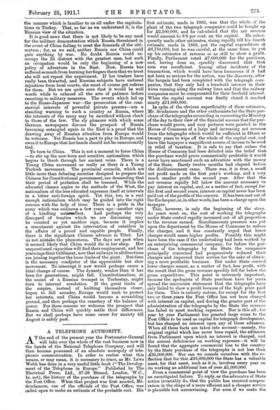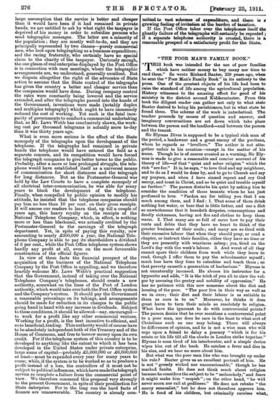A TELEPHONE AUTHORITY.
AT the end of the present year the Postmaster-General will take over the whole of the vast business now in the hands of the National Telephone Company, and will then become possessed of an absolute monopoly of tele- phonic communication. In order to realise what this means, or may mean, it is necessary to trace, as Mr. Laws Webb has done in a very useful little book (" The Develop- ment of the Telephone in Europe." Published • by The Electrical Press, Ltd., 37-38 Strand, London, W.C., ls. net), the history of the purchase of the telegraphs by the Post Office. When that project was first mooted, Mr. Scudamore, one of the officials of the Post Office, was called upon to make an estimate of the probable cost: His first estimate, made in 1866, was that the whole of the plant 'of the two' telegraph companies could be bought up for £2,500,000, and he calculated that the net revenue would amount to 8.8 per cent. on the capital. He subse- quently made other estimates, rising rapidly till his fourth estimate, made in 1869, put the capital expenditure at £6,750,000, but he was careful, at the same time, to put up his estimates of revenue so as still to show a profit. Finally, Parliament voted £7,000,000 for the purchase, and, having done so, speedily discovered that that sum was insufficient. Among other incidents of the transaction, which would have been humorous 'if it had not been so serious for the nation, was the discovery, after the bargain had been completed with the telegraph com- panies, that they only had a leasehold interest in their wires running along the railway lines and that the railway companies must be compensated for their freehold interest. When the capital account was finally closed it reached nearly £11,000,000.
In spite of the obvious superficiality of these estimates, Mr. Scudamore and the other enthusiasts for the State pur- chase of the telegraphs succeeding in converting the Ministry of the day to their view of the financial success that the pur- chase would prove, and rosy pictures were painted in the House of Commons of a large and increasing net revenue from the telegraphs which would be sufficient in fifteen or twenty years to wipe off the whole of the capital cost, and leave the taxpayer a magnificent source of income to be used in relief of taxation. It is safe to say that unless the House of Commons had been deluded into the belief that the purchase would prove commerically profitable it would never have sanctioned such an adventure with the money of the State. Barely twelve months had elapsed before the disillusionment came. There was, it is true, a small net profit made on the first year's working, and a very much smaller profit the second year. After that the net revenue rapidly fell below the amount necessary to pay interest on capital, and, as a matter of fact, except for the first and second years, interest on capital never has been paid out of the profits of the concern. It has been met out of the Exchequer, or, in other words, has been a charge upon the taxpayer.
This, however, is only the beginning of the story. As years went on, the cost of working the telegraphs under State control rapidly increased out of all proportion to the revenue earned. Simultaneously pressure was put upon the department by the House of Commons to reduce the charges, and it was constantly urged that lower charges would mean higher profits. Possibly this might have been the case if the undertaking had been worked by an enterprising commercial company, for before the pur- chase of the telegraphs by the State the companies principally concerned had progressively reduced their charges and improved their service for the sake of obtain- ing a more profitable business. But under State control. lower charges meant, as a matter of fact, less profit., with the result that the gross revenue speedily fell far below the gross expenditure. This point is extremely important, because the apologists of State purchase have for years spread the inaccurate statement that the telegraphs have only failed to show a profit because of the high price paid. for them. This is entirely untrue, for except for the first two or three years the Post Office has not been charged with interest on capital, and during the greater part of the administration of the telegraphs by the State the revenue has failed to meet working expenses. Nor is this all ; for year by year Parliament has granted large sums to the Post Office to be used as capital for telegraph development, but has charged no interest upon any of these advances. When all these facts are taken into account—namely, the original capital which has never been repaid, the advances from Parliament upon which no interest is charged, and the annual deficiencies on working expenses—it will be found that the aggregate commercial loss to the country by the State purchase of the telegraphs is not less than £36,000,000. Nor can we console ourselves with the re- flection that for this £35,000,000 the State has a valuable asset, for that asset, such as it is, involves every year on its working an additional loss of over £1,000,000. From a, commercial point of view the purchase has been an unmitigated failure. To reply, as the advocates of State action invariably do, that the public has received compen- sation in the shape of a-mornefficient and a cheaper service is plausible but unconvincing. For even if we make the large assumption that the service is better and cheaper than it would have been if it had remained in private hands, we are entitled to ask by what right the taxpayer is deprived of his money in order to subsidise persons who send telegraphic messages. The latter are a minority of the population ; they are mostly well-to-do, and they are principally represented by two classes—purely commercial men, who look upon telegraphing as a business expenditure; and the racing fraternity, who certainly have no special claim to the charity of the taxpayer. Curiously enough, the one gleam of real enterprise displayed by the Post Office is in connection with race meetings, where the telegraphic arrangements are, we understand, generally excellent. But we dispute altogether the right of the advocates of State action to assume that the State control of the telegraphs has given the country a better and cheaper service than the companies would have done. During company control the rates were constantly being lowered and the service extended, and after the telegraphs passed into the hands of the Government, inventions were made (notably duplex and multiplex telegraphy) which ought to have immensely reduced the cost of working. Yet such is the fatal inca- pacity of governments to conduct a commercial undertaking that, as Mr. Laws Webb has conclusively shown, the work- ing cost per thousand telegrams is actually more to-day than it was thirty years ago.
What is even more serious is the effect of the State monopoly of the telegraphs upon the development of the telephone. If the telegraphs had remained in private hands the telephone would have entered the field as a separate concern, and its competition would have forced the telegraph companies to give better terms to the public. Probably, after a more or less prolonged struggle, the tele- phone would have established itself as a universal means of communication for short distances and the telegraph for long distances. But as the Postmaster-General was held by the Law Courts to have a complete monopoly of all electrical inter-communication, he was able for many years to block the development of the telephone. Finally, when compelled by public opinion to modify his attitude, he insisted that the telephone companies should pay him no less than 10 per cent. on their gross receipts. It will amuse our readers to learn that, up till a couple of years ago, this heavy royalty on the receipts of the National Telephone Company, which, in effect, is nothing more or less than blackmail, was actually credited by the Postmaster-General to the earnings of the telegraph department. Yet, in spite of paying this royalty, now amounting to nearly £300,000 a year, the National Tele- phone Company is able to pay its shareholders a dividend of 6 per cent., while the Post Office telephone system shows hardly any profit at all, even on the most favourable construction of the official figures.
In view of these facts the financial prospect of the acquisition of the business of the National Telephone Company by the Post Office is appalling, and we therefore heartily welcome Mr. Laws Webb's practical suggestion that the Government, instead of taking over the National Telephone Company's telephones, should create a new authority, somewhat on the lines of the Port of London authority, which would take over both the Post Office system and the Company's system. It should pay the Government a reasonable percentage on its takings, and arrangements should be made for reduction in its charges to the public going hand in hand with any increase in dividends. Subject to these conditions, it should be allowed—nay, encouraged— to work for a profit like any other commercial venture. Working for a profit, is the best incentive to efficient, and so to beneficial, trading. This authority would of course have to be absolutely independent both of the Treasury and of the House of Commons, and free to borrow money upon its own credit. For if the telephone system of this country is to be developed to anything like the extent to which it has been developed in the United States under private enterprise, large sums of capital—probably ."..5,4300,000 or £6,000,000 at least—must be expended every year for many years to come; while, if the system is to be worked so as to produce a profit instead of a loss, the controllers of it must not be subject to political influences, which have made the telegraph service so complete a failure from the commercial point of view. We therefore commend this proposal very strongly to the present Government, in spite of their predilection for State enterprise. For in the long run the hard facts of finance are unanswerable. The country is already com- mitted to vast schemes of expenditure, and there is growing feeling of irritation at the burden of taxation.
If the Post Office takes over the telephones itself the ghastly failure of the telegraphs will certainly be repeated ; if a separate telephone authority is created, there is a reasonable prospect of a satisfactory profit for the State.







































 Previous page
Previous page